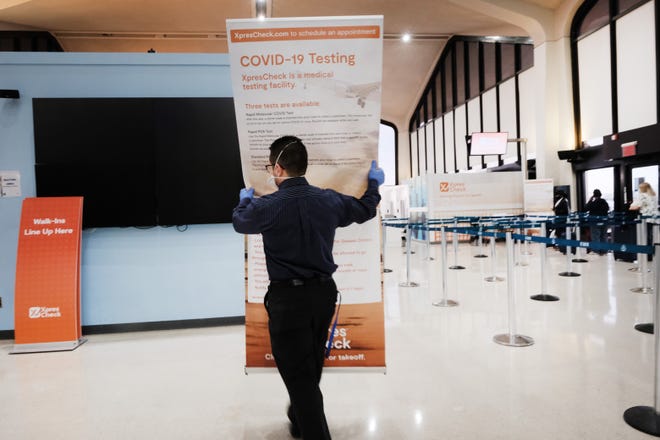To combat the spread of the new omicron COVID-19 variant, the Centers for Disease Control and Prevention are tightening testing requirements for international travelers.
Currently, air travelers to the United States who haven’t recently recovered from the virus – including U.S. citizens – must take a negative viral test before boarding their flight, with fully vaccinated travelers required to take it no more than three days before departure. But the CDC said Tuesday that it is “working to modify” the global testing order to give all international air travelers just one day to take a pre-departure test, as first reported by the Washington Post.
“This strengthens already robust protocols in place for international travel,” the CDC said in a statement.

CDC director Rochelle Walensky said during an earlier Tuesday press conference that the CDC was “evaluating how to make international travel as safe as possible,” which could mean shortening the pre-departure testing window or adding additional post-arrival testing and a self-quarantine period.
The agency says it continues to recommend all travelers get a COVID-19 viral test three to five days after arrival, and that any unvaccinated travelers should quarantine upon arrival.
The U.S. is also working to stem the spread of the virus with new travel bans against eight countries that went into effect Monday. The omicron variant has not yet been detectedin the U.S.
WHO releases new omicron travel guidance
Also on Tuesday, the World Health Organization updated its travel guidance to say all unvaccinated travelers over the age of 60 are among those who should postpone travel due to the omicron variant.
The announcement is another sign that international travel restrictions, which grew more lenient in recent months, are tightening up once again to combat the new variant.
Although much about the new variant is still unknown, the WHO suggested certain travelers postpone trips to areas with community transmission. This includes unvaccinated travelers who have not recovered from the virus and “are at an increased risk of developing severe disease and dying,” such as people older than 60 and those with comorbidities such as heart disease, cancer and diabetes.

The WHO labeled the new strain a “variant of concern” due to its “large number of mutations” on Friday, and since then a growing number of countries have reported the variant. The United Nations agency expects more countries will discover the virus within their borders in the coming days.
► Are travel bans worth it?:They could slow the spread of omicron but they have repercussions, experts say
► Travel amid omicron outbreak:The omicron variant has sparked new travel restrictions. Are more COVID rules ahead?
Preliminary evidence suggests the new variant may carry an increased risk of reinfection compared to other variants, but health officials say it will take weeks before they have a firm grasp on the severity of the new strain.
“Studies are ongoing to understand more about these mutations and their impact on transmissibility, virulence, diagnostics, therapeutics and vaccines,” the WHO said.
The new guidance stemming from the omicron variant could potentially be another blow to the global travel industry. The travel and tourism sector lost almost $4.5 trillion in 2020, with contributions to global GDP dropping 49{32bc5e747b31d501df756e0d52c4fc33c2ecc33869222042bcd2be76582ed298} from 2019, according to the World Travel & Tourism Council.
Follow USA TODAY reporter Bailey Schulz on Twitter: @bailey_schulz.





More Stories
How to Pack for the UK Weather (Yes, Even in July!)
An Entrepreneur’s Guide To Responsible Travel
Important Updates on Passport Processing